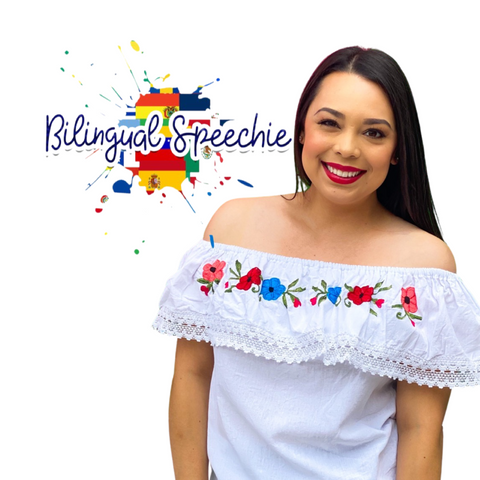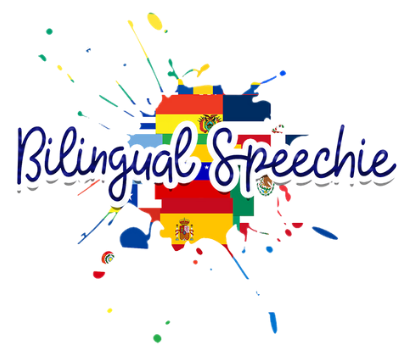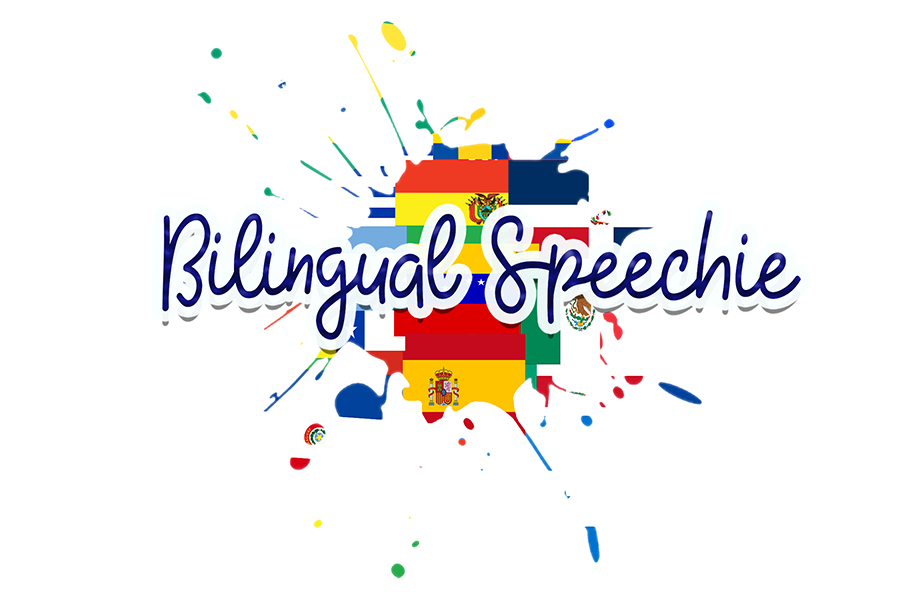by Liliana Diaz January 12, 2023
Perhaps you recently got assigned to a new school or site that consists of a large bilingual and/or multilingual caseload, and perhaps you're not bilingual. Not speaking the student's language can be quite overwhelming and stressful (trust me, I've been there!). I know the feeling of not quite knowing where to start in intervention, or not knowing how to support your students. Well luckily, bilingual SLP, Ingrid Owens-Gonzalez has some important tips to share with all SLPs.
Here are 3 things Monolingual SLPs can do to support bilingual populations today.
In 2021 there were 213,115 ASHA members: only 17,373 (8.2%) self-identified as bilingual service providers; 15,728 SLPs and 911 audiologists.
I begin this blogpost with numbers because it is the most concise way I have found to share my experiences as a bilingual SLP with my monolingual peers. In every single one of my placements I have been the only one. Being the only one is disheartening, at times, overwhelming for sure, but somewhere along the way I realized that the job of supporting bilingual clients, patients, and students is not mine alone. If we are to make a lasting impact it will have to be all 213,115 SLPs working towards more inclusive practices. All service providers have a role to play in supporting Culturally and Linguistically diverse (CLD) populations.
In 2020 there were a total of 14,958 bilingual SLPs. Unfortunately the number only went up by 0.2 % from 2021. Every year these numbers change but they are not changing fast enough to support the growing need for bilingual service providers.
The demographic breakdown of our profession does not match the reality of the communities we serve. As our communities have grown more culturally and linguistically diverse, our field unfortunately has not; so the first thing you can do today to support bilingual clients is to step into your role of communication advocate - especially if you are not bilingual.
I urge you to find out what that means for you. Something that has helped me find my way through is remembering that SLPs may have a broad scope of practice but English proficiency is not within our scope. So here are some things you can do to learn more:
The second thing you can do today to support your bilingual clients is spend more time learning about their language history, language usage, and language background. I have learned that when I gather extensive data prior to developing an evaluation plan my actual testing time is shorter, my report writing is a breeze, and my recommendations are more meaningful. This is a complete and opposite shift in how I used to structure my time for evaluations. There are many resources out there on how to gather and analyze language usage surveys (Bilingual Speechie has a great one you can find right here) but truly it all comes down to “asking the right questions in the right ways'' (Carol Westby et al. 2003).
Adding a language history review to your intake process is a quick and easy first-step to take. As a monolingual provider, spending the time to gather this information may lead to realizing there is a need for an interpreter, a consultation with the multicultural office, or the need for a different assessment tool than you had planned. As a profession we are ethically bound to perform our job in a way that does not cause harm to the individuals we serve. Misdiagnosis of bilingual individuals is the definition of harm. I don’t say this to add more to your plate. I say this because I have been where you are: overwhelmed, working past my contract hours, and wondering how one person can juggle so much. I say this because I have seen the other side of implementing these changes and it leads to support for my bilingual students from other departments, it leads to less and less unnecessary evaluations and placements, and more time for me to support the students who truly need it.
Our greatest currency in every setting seems to be time. Often, when I bring up my concerns about bilingual language assessment, dynamic assessment, and treatment for bilingual individuals the number one barrier seems to be time: we don’t have enough time to learn these things that they didn’t teach us in grad school, we don’t have enough time to give more than one test, we don’t have enough time to gather a language sample, and we definitely don’t have time to do this in more than one language. Insert your preferred cliche about time here: “we all have the same 24 hours in a day” “time is money” “a stitch in time…” - this post is not that, but I do believe we are all capable of learning new things as a collective field. We have all been through rigorous grad school courses, we’ve all passed the same Praxis exam, and we are all bound by the same ethical guidelines.
The U.S. has a history of centering English-only. Our field has a history of pathologizing bilingual language experiences. By extension all of us growing up in this system carry some form of linguistic bias whether consciously or unconsciously. This shows up in our institutions where very few of us have training in typical language development in bilingual individuals. Even fewer of us have training in language loss in bilingual patients with dementia, aphasia presentation in bilingual patients, multiple language interactions in TBI, gestalt language processing in bilingual children, etc. This singular focus on English deeply impacts the way we deliver services to multilingual individuals. As Bilingual SLPs it often falls on us to lead the way. I’m here to tell you it’s not enough and we need you alongside us. You don’t need to be bilingual or have specialized training to start. You don’t need to be bilingual to join us in improving the way we provide services to bilingual clients. I don’t know what that looks like in your setting but I will share three small changes that have made a world of difference in mine:
While these changes seem small they open the door to productive conversations, to inclusivity, and to actionable change. I welcome you to reflect on how you can make your own intervention and assessment processes more inclusive. I invite you to comment down below and mention some ways that you have changed your practice recently.

Get in contact with Ingrid here:
Website: The Bold SLP Collective
Email: theboldslpcollective@gmail.com
Instagram: @theboldslpcollective
Tik Tok: @theboldslp
Sources:
Comments will be approved before showing up.
by Liliana Diaz December 14, 2023
by Liliana Diaz July 23, 2023
Have a client on your caseload that is demonstrating difficulty producing the CH sound? Perhaps you're a parent whose child is in speech therapy working on the CH sound? The CH sound can be a tricky sound to teach because it's hard to visually see what's going on inside the mouth when saying the sound. But no worries, here are some tips to help achieve that tricky CH sound.
by Liliana Diaz February 13, 2023 1 Comment

Who are we?
Bilingual Speechie LLC. is a small business dedicated to providing inclusive and engaging speech therapy resources and activities for bilingual children, parents, SLPs and educators.
Bilingual Speechie LLC promotes bilingualism and multilingualism by dispelling common myths, providing education on bilingual language development, and promoting heritage language maintenance amongst bilingual families.
About the Owner:
Liliana Diaz-Vazquez is a certified licensed bilingual speech language pathologist (SLP), currently practicing in Chicago, Illinois. She obtained her bachelor’s degree in communication disorders (2012) and her master’s degree in speech language pathology at Saint Xavier University (2014). She is a certified member of the American Speech-Language and Hearing Association (ASHA) since 2014, a member of the Illinois Speech and Hearing Association (ISHA) since 2014 and maintains licensure in the state of Illinois.
Liliana is a first-generation Mexican-American Latina, a small business owner, a full-time school-based SLP, & a bilingual parent, who takes pride in her roots, culture, & heritage language. She loves being able to share her experience as a Latina SLP, and a bilingual mom, as well as her culture & heritage language with the educator, SLP, and parent community.
Liliana Diaz-Vazquez has extensive experience working with the bilingual English and Spanish speaking population & multilingual population. She specializes in augmentative/alternative communication (AAC), bilingual language development and language delays/disorders in bilingual/multilingual children. She has also worked in the early intervention setting for several years where she gained vast experience working with interpreters and bilingual/multilingual families.
Liliana began creating digital bilingual resources and activities in 2014 out of need while working full-time in the school setting as a SLP. Liliana worked with many Spanish-speaking families and quickly realized that there were limited Spanish and bilingual speech therapy resources available for her students and their families. In addition, Liliana quickly became aware that there was a need for education about bilingualism and typical bilingual language development as many of the families she worked with had encountered misinformation about bilingualism. Liliana began developing resources and eventually started Bilingual Speechie LLC with the mission to provide education to SLPs and families about bilingualism, as well as provide inclusive and diverse materials for speech therapy in order to help bilingual families and SLPs gain access to appropriate bilingual materials for children with communication disorders.
Today Liliana currently works full-time in the Chicago public school setting as a lead bilingual SLP where she consults and collaborates with SLPs daily to help them understand how to assess and provide culturally and linguistically appropriate services for bilingual and/or multilingual students. She also runs her small business, Bilingual Speechie LLC, and is on a mission to expand and grow her business so that all SLPs, educators, and families can have access to inclusive, diverse, and bilingual resources in a variety of languages for speech therapy.
Professional Development:
Liliana has vast experience as a speaker/presenter and has presented at several conferences over the years. You can view all previous conferences and topics that Liliana has presented on here. Liliana is available to present on topics such as best practices when working with multilingual populations, bilingual speech/language assessment and treatment, goal writing with multilingual populations and much more. If you are interested in booking Liliana for a conference or event please don't hesitate to send an email at lilianadiaz@bilingualspeechie.com
 English
en
English
en
 English
en
English
en
 Español
es
Español
es


Liliana Diaz
Author